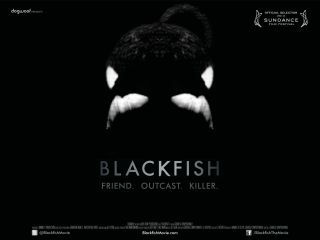Environment
Blackfish Friday
Will the Macy’s Parade help turn “Shamu” into a poster-child for global change?
Posted November 25, 2013

Many of us, it seems, are overwhelmed, paralyzed, in denial, and even traumatized by the now constant blast of horrifying news detonating before our eyes. Some even say that we are living in one of the most psychologically difficult times ever to be alive. So when a story comes along that gives back to people not only their natural outrage response but also a place to focus it and effect change, we might expect that story to contain much larger truths about life in this era than the story itself.
If you watch the Macy’s Thanksgiving Day Parade this year, you’ll witness one chapter in such a story. Macy’s, you see, refuses to back down on the SeaWorld float slated for its parade. Despite more than 80,000 signatures asking for SeaWorld’s dismissal, and the added voices of famous celebrities likewise calling for SeaWorld’s elimination, Macy’s Inc. said recently, “The parade has never taken on, promoted or otherwise engaged in social commentary, political debate or other forms of advocacy.” Further, Macy’s parade executive producer Amy Kule added, “There is no controversy. Our goal is to entertain, and that is their goal, as well.” (see also Elizabeth Batt’s Digital Journal piece on the blunder Macy’s made when it equated its “entertainment” goals with SeaWorld’s).
The Macy’s “no controversy” statement is almost laughable if it weren’t so troubling. It’s either an inadvertent and massive departure from reality on their part, or another alarming example of corporate hype meant to mislead well-meaning Americans. Because, it turns out, the Macy’s SeaWorld debacle is merely the tip of a fast-melting iceberg: to claim there is no controversy is not only false, it appears to be one of a few last-gasp attempts by corporate overlords to stifle tens of thousands of voices rising for justice. In much the same way the word “Shamu” is used to perpetuate forced slavery and prostitution, by claiming “no controversy” Macy’s language softens and distracts from the brutal facts embodied in the SeaWorld float. A float that in no way represents those facts. At issue is the bellwether. As I wrote in Shamu the Slut:
“I knew when I read Death at SeaWorld last summer that this book was about much more than killer whales. It was about our society, how it’s structured, and the systems we have in place that allow, and even encourage, brutalization of animals, people and the Earth…legal and corporate systems that continue to foster climate change and other instances of severe deterioration of our natural systems. What I didn’t know, then, was that Death at SeaWorld was a bellwether, one of the first in this particular upheaval.”
The brilliant documentary Blackfish, of course, is another key index of the bellwether phenomenon. A bellwether is “any entity in a given arena that serves to create or influence trends or to presage future happenings.” And as Elizabeth Batt chronicled last week, “In just 83 minutes, Blackfish appears to have changed some people's perception of SeaWorld forever.”
Even the Wall Street Journal referred to the “Blackfish Effect” when reporting on SeaWorld’s questionable financial health in a story that quotes SeaWorld Chief Executive Jim Atchison as saying, "Growing attendance is not our focus. Our focus is driving our financial performance."
Financial performance? Yet SeaWorld would have us believe its mission is research, education and conservation.
So when I asked on November 7, “Will Blackfish blacklist Blackstone?” the death knell had already begun to toll. SeaWorld’s corporate canard—it’s “false or misleading report or story, especially if deliberately so”—is finished.
Because a very few things you you won’t learn from Macy’s “no controversy” statement (or from the SeaWorld float for that matter) are:
- On November 6, the Orlando Sentinel reported that during the previous week the “chairman of SeaWorld Entertainment Inc.'s board of directors sold nearly $1.3 million worth of company stock.”
- On November 20, MarketWatch reported that the “Private-equity firm Blackstone Group L.P. plans to trim its ownership stake in SeaWorld Entertainment Inc. by 15 million shares, following the theme-park operator's public listing in April… The new stock sale would cut Blackstone's ownership in the company from 63% to 46%, not including an underwriter option, resulting in SeaWorld no longer being a "controlled company" under New York Stock Exchange governing standards.”
- Best-selling author of the epic Death at SeaWorld, David Kirby shared (also on November 20) that St. Martin's Press had already rush-ordered a fourth paperback edition. This, after the first paperback edition was released on July 2, just two weeks before Blackfish went to theaters nationwide. A quick scan of the comments at Goodreads.com shows that people flock to buy Kirby’s book after watching Blackfish. Which helps explain a fourth printing on rush-order less than five months after its initial release.
- On November 21, Blackfish aired in the UK on BBC Four, and a concurrent Blackfish tweetstorm shows little sign of slowing down. Meanwhile, on November 6, a Twitter blog recounted the "#Blackfish phenomenon" and discussed how a "whale of a tale takes over Twitter."
- On November 12, SeaWorld went back to court to appeal to a federal panel, “asking it to overturn Occupational Safety and Health Administration safety citations and a ban restricting how humans interact with killer whales during performances.” CNN’s Vivan Kuo reported that:
“The appeal hearing, normally held in a courtroom, garnered such high interest that it was held at a public forum at the Georgetown University Law Center. The venue was the first time oral arguments for the D.C. Circuit have been heard outside of the court. Spectators included Georgetown University law students, the general public and SeaWorld employees.”
Representing SeaWorld was Eugene Scalia, son of Supreme Court Justice Antonin Scalia, who, as quoted in Kuo's piece, “argued in the hearing that OSHA is overstepping its bounds and has no more of a right to impose restrictions on a specialized industry like SeaWorld than it does to regulate tackling in the NFL or impose speed limits in NASCAR.” Scalia did not mention that these “restrictions” would be designed to protect trainers from some of the largest, most intelligent and social predators on Earth who are trapped against their will in what amounts to prison.
But as Kuo related, Benjamin Briggs, an attorney specializing in labor law pointed out that, "There's a long and well-documented track record of these types of animals behaving aggressively toward humans to the point that they've caused a number of fatalities, not only at SeaWorld, but at a number of places," Briggs said. "That is what OSHA is going to say: 'You absolutely were on notice of this, this is absolutely a recognized hazard.' This kind of track record is not one you can ignore. So it's very important; it's what OSHA's case really hinges upon."
- CNN, which swept the ratings with its premier of Blackfish on October 24 (including encore showings), is showcasing the best of investigative journalism and linking it with social media in their innovative CNN Films, Blackfish interface.
Still, you can learn something from the SeaWorld float. A float that Macy’s endorses, and—here’s a kicker—that was “designed and built by the Macy’s Parade Studio,” says SeaWorld’s Corporate Vice President of Entertainment, Dennis Wirzman at MiceChat.com. He adds “…we work closely with their design team, and we have had a great time collaborating with their team with a lot of sculpted foam, it has a nice and beautiful undersea environment theme. Very beautiful and very realistic. We are very excited about that.”
What you can learn is that this “realistic” float is built on supreme irony: it depicts wild killer whales swimming free in their natural environment. Is the float a willful attempt by SeaWorld—and apparently Macy’s—to mislead and misinform? SeaWorld killer whales are unable swim free with their families, they suffer from extreme isolation and poor health, they die much younger than their natural age, they are unable to live out any of their natural daily behaviors, and they endure daily stressors we’d classify as torture if applied to human beings. For all the “good” that SeaWorld may do with its rescues, its research, and its education, from here on out, if it perpetuates this depraved scale of falsehood about captive cetaceans it will obliterate all the trust it’s built up with its fans.
What's more, the bitter irony of Macy's SeaWorld float may well be explained to tens of millions of people on Thanksgiving Day...accelerating the Blackfish Effect. Because here is a peek at the larger truths embedded in this story. Corporations are not human. So far, they exist mainly to make money. "Shamu" makes vast amounts of money for SeaWorld. The whales known as Shamu have also provoked a sense of awe and reverence in the millions of people who’ve seen these magnificent beings up close. But now that natural human devotion is capsizing SeaWorld’s corporate credibility. People who’ve come to love the whales can no longer tolerate their suffering. SeaWorld has not so much educated the public about killer whales as its opened people’s hearts to bravely witnessing brutal injustice and to demanding systemic change.
Just the kind of open hearts that can unleash global harmony.
Blackfish is fast becoming a poster-child for overturning an entire culture of corporate dominion. And that’s a truth for which Shamu—and all of us—might be truly grateful.

Join the Mothering Nature conversation on Facebook and Twitter, and unleash your epic force for harmony on Earth.
© Rachel Clark. Reprint with the specific permission of the author.
A note on comments: I read and dearly appreciate every comment. I rarely respond in honor of devoting my time to writing, family, and community. Your comments are important to me, and may inspire future posts. If comments are disrespectful of basic and established science, civil discourse, or kindness, I will remove them.
[NOTES:]
For more (in the last week) on the Macy’s SeaWorld float uproar:
- The New York Times
- Christian Science Monitor
- National Geographic
- CNN
- USA Today
- Salon
- The New York Post
- Boston.com
- Gothamist.com
- Digital Journal
- Buzzfeed
- Ecorazzi
For more on the OSHA/SeaWorld hearings:
- The Christian Science Monitor
- CNN
- Take Part
- The Orlando Sentinel
- Huffington Post
- The Orca Project
And three stories from the New York Times that broke in conjunction with the national release of Blackfish in theaters nationwide on July 19. From:
- The Science Times
- Business Day
- Movies (where Blackfish was named a NYTs Critics Choice)
Along with a New Statesmen piece published on July 15, that asked Did a killer whale doc just kill an industry?




